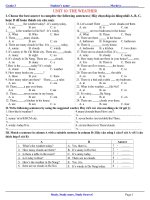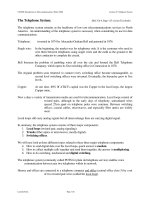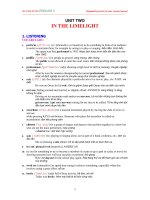Tài liệu UNIT 12: THE RIGHT APPROACH doc
Bạn đang xem bản rút gọn của tài liệu. Xem và tải ngay bản đầy đủ của tài liệu tại đây (79.59 KB, 5 trang )
UNIT 12: THE RIGHT APPROACH
1 READING
1. approach /C’prCUtS/ noun [count] attempt to make a business arrangement with: thăm dò, tiếp
xúc (để đạt 1 thỏa thuận).
The club has made an approach to a local business firm for sponsorship.
[count] an act of communicating with another person or group in order to ask for something: cách
tiếp cận, phương pháp.
A new approach to language teaching: Phương pháp mới về dạy ngôn ngữ.
approach (verb) to speak, write or visit someone in order to do something such as make a
request or business agreement: tiếp xúc, tiếp cận.
2. permission /pC’mISn/ noun [uncount] the right to do something that is given to you by someone in
authority: sự cho phép, giấy phép.
They entered the area without permission.
permit /pC’mIt/ (verb) [transitive] to allow someone to do something, or something to happen:
cho phép
permit sb to do sth
permit sb sth
She permitted herself a single candy bar a week.
permit of sth (phrasal verb) [transitive] to make sth possible: cho phép, thừa nhận.
The situation does not permit of any delay: Tình thế không cho phép bất kỳ sự trì hoãn nào.
3. someone can’t stand someone/something: used for saying that the person dislikes someone or
something very much: chịu đựng cái gì/ai
I can’t stand milk.
John just can’t stand his mother-in-law.
4. earplugs /’IrplVg/ noun [count] a small piece of soft material such as wax, cotton or plastic that you
put into your ear to keep noise or water out: cái nút tai
5. client /’klaICnt/ noun [count] a customer or someone who receives sevices: khách hàng
Mr. Black has been a client of this firm for many years.
6. intrusive /In’trusIv/ (adj) interrupting a peaceful situation: gây phiền phức
intrusive noise/lights/tourists
intrude /In’tru:d/ verb [intransitive] to go into a place or situation in which you are not wanted
or not expected to be: xâm phạm
intrusion /In’truZn/ on/upon/into something noun [count or uncount] something that
interrupts a peaceful situation or a private event: việc gây phiền phức.
It’s so quiet here that the occasional distant noise is the only intrusion.
7. co-worker /,kCU ’wE:kC(r)/ noun [count] someone who works with you, especially someone with
a similar position or status in an organization: đồng nghiệp
8. cubicle /’kju:bIkl/ noun [count] a small enclosed area in a room, separated from the rest of the room
by thin walls or curtains: phòng ngủ nhỏ (ở bệnh viện, trường học…)
9. strain /streIn/ verb [transitive or intransitive] to try very hard to do something: ráng sức, cố gắng,
gắng sức.
to strain one’s ears/eyes: to try very hard to hear or see something: vểnh tai/căng mắt
10. scene /si:n/ noun [count] a noisy argument or a strong show of feelings in a public place: trận cãi lộn
make/cause a scene: gây chuyện cãi lộn
1
11. compromise /’kOmprCmaIz/ verb [intransitive] ~ on sth: to solve a problem or end an
argument by accepting that you cannot have everything that you want: dàn xếp
We simply cannot compromise on the question of human rights.
compromise /’kOmprCmaIz/ noun [count or uncount] a way of solving problem or ending
an argument in which both people or groups accept they cannot have everything they want: sự
thoả hiệp, cách giải quyết.
Most wage claims are settled by compromise: Phần lớn các yêu sách về tiền lương đã được giải
quyết bằng thoả hiệp.
12. accessible /Ck’sesCbl/ (adj) ~ to: easy for anyone to obtain and use: có thể tới được, có thể sử
dụng được.
documents not accessible to the public: những tài liệu không mở rộng cho công chúng sử dụng.
access /’Akses/ noun [uncount] the right or opportunity to have or use something that will
brings you benefits: cơ hội hoặc quyền sử dụng cái gì.
Students must have access to a good library: Sinh viên phải được quyền vào đọc sách ở 1 thư viện
tốt.
access /’Akses/ verb [transitive] to get information, especially from a computer: lấy thông tin
hoặc đưa thông tin vào (máy tính)
13. granted /’grAntCd/ (adv) used when you are admitting that something is true: cứ cho là như vậy,
cứ công nhận như vậy.
Granted, it’s splendid car, but have you seen how much it costs? Cứ cho là như vậy, đó là 1 chiếc
xe tuyệt vời, nhưng anh đã xem nó giá bao nhiêu chưa?
Take something for granted: to believe something to be the truth without even thinking about
it: cho rằng cái gì là đúng.
I take it for granted you have read this book: Tôi cứ coi như là anh đã đọc cuốn sách này rồi.
14. considerate /kCn’sIdCrCt/ (adj) ~ (of sb); ~ (to do sth); ~ (towards sb) thinking about the
feelings and needs of other people: chu đáo, ý tứ
It was considerate of you not to play the piano while I was asleep: Ông thật là ý tứ đã không vhơi
đàn piano lúc tôi đang ngủ.
consideration /kCn,sIdC’reISn/ noun [uncount] careful thought before making a decision
or judgment about something: sự suy xét, sự cân nhắc.
Please give the matter your careful consideration.
under consideration: being thought about
15. the initiative /I’nISCtIv/ noun [singular] the opportunity to take action before other people do: thế
chủ động
take the initiaitive: dẫn đầu, làm đầu tàu
It’s up to this country to take the initiative in banning nuclear weapons: Nước này cần phải đi đầu
trong việc cấm vũ khí hạt nhân.
initiate /I’nISIeIt/ verb [transitive] to make something start: khởi sự, khởi xướng
initiate proceedings against sb: khởi tố ai
4 LISTENING
16. fire /’faIC(r)/ verb [transitive] to make someone leave their job, sometimes as a punishment: sa thải
He’s the person responsible for hiring and firing.
17. gossip /’gOsIp/ noun [uncount] conversation about unimportant subjects, especially people’s private
lives: chuyện tầm phào, chuyện ngồi lê đôi mach.
I never listen to office gossip.
18. nasty /’nAstI/ (adj) bad or very unpleasant: khó chịu, kinh tởm
2
There’s a nasty smell in here.
19. frustrated /frVs’treItId/ (adj) feeling annoyed and impatient because you are prevented from
achieving sth: không hài lòng, nản lòng.
Are you feeling frustrated in your present job?
frustrate /’frVstreIt/ verb [transitive] to make someone feel annoyed or discouraged because
they cannot achieve what they want: làm (ai) nản lòng
Mary was frustrated by the lack of appreciation shown of her work: Mary rất nản lòng vì công việc
của cô không được đánh giá cao.
frustration /frV’streISn/ noun [count or uncount] an annoyed or impatient feeling that you
get when you are prevented from doing what you want: (tình trạng) nản long, không thoả mãn; sự
bực mình.
Every job has its frustrations.
5 VOCABULAIRY: JOBSB AND WORK
20. overtime /’CUvCtaIm/ noun [uncount] extra hours that someone works at their job: ngoài giờ.
I have been working a lot of overtime lately.
overtime work/pay/rates
21. promote /prC’mCUt/ verb [transitive] to move someone to a job at a higher level: đề bạt, thăng
chức, thăng cấp.
She worked hard and was soon promoted.
promotion /prC’mCUSn/ noun [count or uncount] a move to a higher level in a company,
institution or sport: sự đề bạt, thăng chức.
If you are successful, you can expect promotion.
22. resign /rI’zaIn/ verb [intransitive or transitive] ~ (from sth): to state formally that you are leaving a
job permanently: từ chức.
resign oneself to sth/doing sth: to accept that something unpleasant must happen and that you
cannot change it: cam chịu.
be resigned to one’s fate: cam chịu số phận
23. salary /’sAlCrI/ noun [count] a fixed amount of money agreed every year as pay for an employee,
usually paid directly into his or her bank account every month: tiền lương.
an annual salary of $12.000
be on salary: earn a salary
Are you on salary or do you get paid by the hour?
salaried /’sAlCrId/ (adj) being paid a salary: ăn lương, được trả lương.
24. lay off /leI Of/ phrasal verb [transitive] to end someone’s employment, especially temporary because
there is not enough work for them: sa thải (công nhân), thường trong một thời gian ngắn.
They’ve had to cut back production and lay off workers.
7 SPEAKING
25. expense /Ik’spents/ noun [count] an amount of money you spend in order to buy or do
something: phí tổn.
Most children in Britain are educated at public expense: Phần lớn trẻ em ở Anh được học tập do
nhà nước trả tiền.
26. champion /’tSAmpICn/ noun [count] someone who has won an important competition, especially
in a sport: nhà vô địch, quán quân.
An Olympic champion
3
27. stranded /’strAndId/ (adj) unable to leave somewhere because of an inconvenience such as a lack
of transport or money: bị kẹt, lâm vào cảnh khó khăn.
He left me stranded in town with no car and no money for a bus.
28. take turns: if people take turns, each of them does their share of it, one after the other: lần lượt, thay
phiên nhau (làm cái gì)
We took turns steering the boat.
8 READING
29. coaster /’kCUstC(r)/ noun [count] a small piece of wood, plastic or other material that you put a
glass or cup on to protect a surface from heat or liquid: miếng lót cốc, ly (ở bàn).
30. trash can /trAS kAn/ noun [count] a metal or plastic container for things that you want to get rid
of: thùng rác
31. bouquet /bU’keI/ noun [count] a collection of flowers, cut and tied together in an attractive way: bó
hoa
32. wrapper /’rApCr/ noun [count] a piece of paper, plastic, etc. that is wrapped around something you
buy: giấy gói.
Candy wrappers
33. container /kCn’teInCr/ noun [count] something used for storing or holding things, for example a
box, bottle or bowl: vật đựng, vật chứa (chai, hộo…)
a plastic drinks container
34. even /’i:vCn/ (adj) an even number can be divided exactly by two, for example 2, 4 and 6 are even
numbers: số chẵn.
35. odd /Od/ (adj) an odd number is a WHOLE NUMBER that cannot be divided exactly by two, for
example 1, 3, 5 and 7 are odd numbers: số chẵn.
36. insult /In’sVlt/ verb [transitive] to say or do something to someone that is rude or offensive: xúc
phạm.
insult: noun [count] ~ to sb/sth an offensive remark or action: lời nhận xét hoặc hành động xúc
phạm
37. host /hCUst/ noun [count] someone who invites people to a meal or party, or to stay in their home:
chủ nhà
They had brought a present for their hosts.
hostess /’hCUtIs/ noun [count] a woman who invites someone to a meal or party or to stay for
a short time in her home: bà chủ
38. manner /’mAnCr/ noun [plural] the custom or accepted social behavior of a particular group of
people: tập quán và phong tục
German middle-class manners
39. crunch /krVntS/ verb [intransitive or transitive] to bite hard food, causing it to make a loud noise:
nhai rau ráu
Jane was crunching peanuts noisily.
40. tasteless /’teIstlCs/ (adj) having no flavor: vô vị
a tasteless piece of chicken
4
41. wafer /’weIfC(r)/ noun [count] a very thin dry biscuit which is often sweet and flavored: bánh xốp
42. typical /’tIpIkl/ (adj) used for saying that someone is behaving in the way they usually behave: đặc
trưng, đặc thù (của một người hay vật riêng biệt).
It is typical of her to forget: Cô ta có tính hay quên.
typify /’tIpIfaI/ verb [transitive never progressive] to be an excellent or typical example of
something, to be a typical part or feature of something: làm mẫu cho; là điển hình của, là thí dụ
tiêu biểu cho.
Now a millionaire, he typified the self-made man: Nay trở thành nhà triệu phú, ông ấy là tiêu biểu
cho loại người tự lập.
43. intonation /,IntC’neISn/ noun [count oor uncount] the way in which your voice rises or falls when
you speak: ngữ điệu.
In English, some questions have a rising intonation: Trong tiếng Anh, một số câu hỏi có ngữ điệu
lên giọng.
A change of intonation: sự thay đổi ngữ điệu.
44. range /reIndZ/ [count] [singular] the limits within which a person or organization is able to deal
effectively with something: giới hạn trong đó cái gì thay đổi, phạm vi.
There’s a wide range of ability in the class: Trong lớp có nhiều loại năng lực cao thấp khác nhau.
45. enthusiasm /In’Tu:zI,AzCm/ noun [uncount] the feeling of being very interested in something or
excited by it: nhiệt tình.
feel no enthusiasm for/about an idea: Cảm thấy không thiết tha đối với một ý kiến.
enthusiasitic /In,Tu:zI’AstIk/ (adj) (~ about/over sth/sb) very interested in something or
excited by it: tràn đầy nhiệt tình.
She is very enthusiastic about singing: Cô ấy rất say mê hát.
46. block /blOk/ noun [count] an area of buildings in a town or city with streets on all four sides: nhóm
các tòa nhà lớn đứng giữa bốn con đường.
He lives three blocks away from here: Anh ta sống cách đây 3 dãy phố.
47. be in/out of touch /tVtS/ (with someone) to/not see, speak to, or write to someone: còn liên lạc
với ai
Let’s keep in touch: Chúng ta hãy giữ liên lạc với nhau.
5









